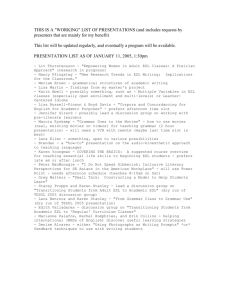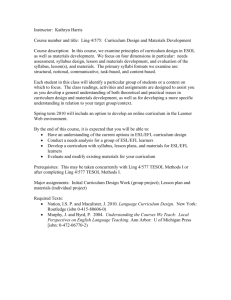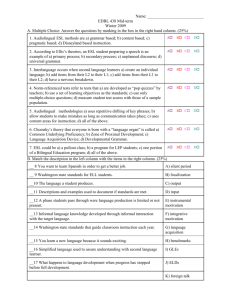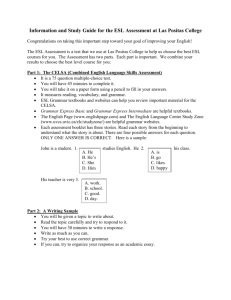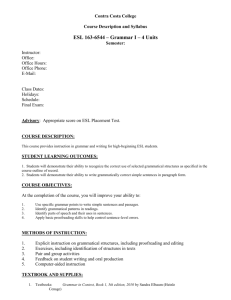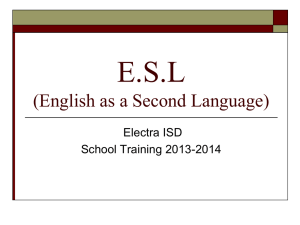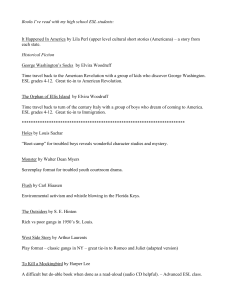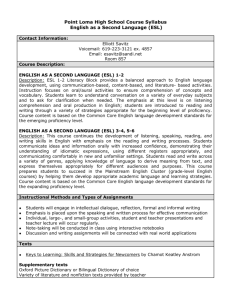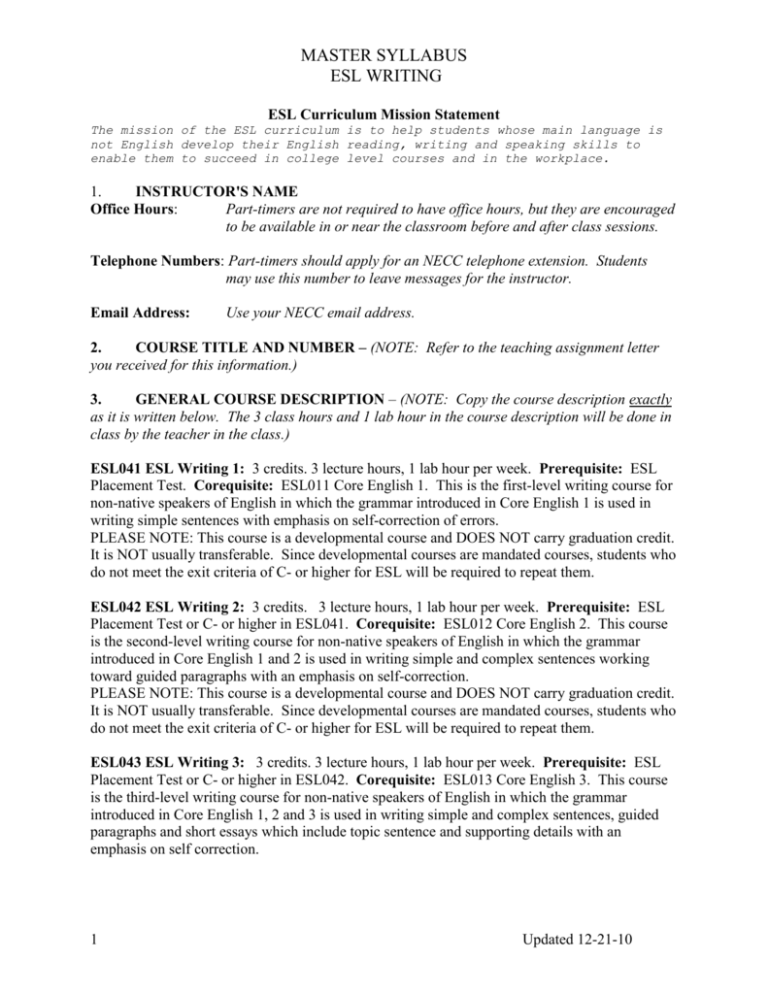
MASTER SYLLABUS
ESL WRITING
ESL Curriculum Mission Statement
The mission of the ESL curriculum is to help students whose main language is
not English develop their English reading, writing and speaking skills to
enable them to succeed in college level courses and in the workplace.
1.
INSTRUCTOR'S NAME
Office Hours:
Part-timers are not required to have office hours, but they are encouraged
to be available in or near the classroom before and after class sessions.
Telephone Numbers: Part-timers should apply for an NECC telephone extension. Students
may use this number to leave messages for the instructor.
Email Address:
Use your NECC email address.
2.
COURSE TITLE AND NUMBER – (NOTE: Refer to the teaching assignment letter
you received for this information.)
3.
GENERAL COURSE DESCRIPTION – (NOTE: Copy the course description exactly
as it is written below. The 3 class hours and 1 lab hour in the course description will be done in
class by the teacher in the class.)
ESL041 ESL Writing 1: 3 credits. 3 lecture hours, 1 lab hour per week. Prerequisite: ESL
Placement Test. Corequisite: ESL011 Core English 1. This is the first-level writing course for
non-native speakers of English in which the grammar introduced in Core English 1 is used in
writing simple sentences with emphasis on self-correction of errors.
PLEASE NOTE: This course is a developmental course and DOES NOT carry graduation credit.
It is NOT usually transferable. Since developmental courses are mandated courses, students who
do not meet the exit criteria of C- or higher for ESL will be required to repeat them.
ESL042 ESL Writing 2: 3 credits. 3 lecture hours, 1 lab hour per week. Prerequisite: ESL
Placement Test or C- or higher in ESL041. Corequisite: ESL012 Core English 2. This course
is the second-level writing course for non-native speakers of English in which the grammar
introduced in Core English 1 and 2 is used in writing simple and complex sentences working
toward guided paragraphs with an emphasis on self-correction.
PLEASE NOTE: This course is a developmental course and DOES NOT carry graduation credit.
It is NOT usually transferable. Since developmental courses are mandated courses, students who
do not meet the exit criteria of C- or higher for ESL will be required to repeat them.
ESL043 ESL Writing 3: 3 credits. 3 lecture hours, 1 lab hour per week. Prerequisite: ESL
Placement Test or C- or higher in ESL042. Corequisite: ESL013 Core English 3. This course
is the third-level writing course for non-native speakers of English in which the grammar
introduced in Core English 1, 2 and 3 is used in writing simple and complex sentences, guided
paragraphs and short essays which include topic sentence and supporting details with an
emphasis on self correction.
1
Updated 12-21-10
MASTER SYLLABUS
ESL WRITING
PLEASE NOTE: This course is a developmental course and DOES NOT carry graduation credit.
It is NOT usually transferable. Since developmental courses are mandated courses, students who
do not meet the exit criteria of C- or higher for ESL will be required to repeat them.
ESL044 Writing 4: 3 credits. 3 lecture hours, 1 lab hour per week. Prerequisite: ESL
Placement Test or C- or higher in ESL043. Corequisite: ESL014 Core 4. This is the fourthlevel writing course for non-native speakers of English. The grammar introduced in Core
English 1, 2, 3 and 4 is used in writing essays utilizing the principles of process writing,
including pre-writing, drafting, revising and editing with an emphasis on self correction. This
course requires approximately one hour per week of supervised work in a computer lab during
class time.
PLEASE NOTE: This course is a developmental course and DOES NOT carry graduation credit.
It is NOT usually transferable. Since developmental courses are mandated courses, students who
do not meet the exit criteria of C- or higher for ESL will be required to repeat them.
4.
ALL REQUIRED TEXTS, INCLUDING INFORMATION ON PUBLISHER AND
EDITION USED – (NOTE: You may choose your texts, but the following texts are
recommended.)
ESL041 ESL WRITING 1
1.
COMPOSITION PRACTICE Book 1 3/ed. Lonan-Blanton. Cengage.
ISBN 9780838419939
2.
A good bilingual dictionary.
3.
Teacher selected materials to supplement the text.
ESL042 ESL WRITING 2
1. WRITERS AT WORK: THE PARAGRAPH. Singleton. Cambridge University Press. 2005.
ISBN 978052154522.
OR
COMPOSITION PRACTICE BOOK 2, 3ed. Lonan-Blanton. Cengage. ISBN
9780838419984.
2.
3.
LONGMAN BASIC DICTIONARY OF AMERICAN ENGLISH. Pearson. 1999.
ISBN 0-582-33251-5.
Teacher selected materials to supplement the text.
ESL043 ESL WRITING 3
1. WRITERS AT WORK: THE SHORT COMPOSITION. Strauch. Cambridge University
Press. ISBN 978052154496.
OR
GRAMMAR WRITE AWAY. 1988. Rubin. Contemporary Books. ISBN9780809248063
2
Updated 12-21-10
MASTER SYLLABUS
ESL WRITING
2.
3.
LONGMAN ADVANCED AMERICAN DICTIONARY w/CD. Pearson. 2007.
ISBN 140-582954-0
Teacher selected materials to supplement the text.
ESL044 ESL WRITING 4
1.
READY TO WRITE 3, 3/ed: Blanchard and Root. Pearson. 2010. ISBN
9780131363342.
OR
INTRODUCTION TO ACADEMIC WRITING, 3rd ed. Oshima and Hogue.
Pearson/Longman 2007. ISBN 9780131933958
2.
3.
LONGMAN ADVANCED AMERICAN DICTIONARY w/CD. Pearson. 2007.
ISBN 140-582954-0
Teacher selected materials to supplement the text.
5.
COURSE TOPICS, ASSIGNMENTS AND/OR SUPPLEMENTAL READING (NOTE: In this section list the topics that you plan to cover in this course. You should use the
course objectives and textbook to do this. Also, detail the assignments that will be required for
the course.)
6.
TEACHING PROCEDURES - (NOTE: You should briefly describe the teaching
procedures you will use to attain the course objectives listed for your course. There are some
examples listed under each course, but you can add, delete or change these procedures
depending on how you plan to teach this course.)
ESL 041 ESL WRITING 1
Class work will involve individual, pair and group work that will encourage maximum student
involvement with a focus on developing ideas about a topic before starting to write and on
promoting a cooperative learning approach.
Students will do:
prewriting activities that include reading texts that will be used as writing prompts.
writing, editing and error correction exercises.
guided practice of the vocabulary and the grammar structures that will be needed for the
writing activities.
daily, personal, unedited journal writing.
ESL042 ESL WRITING 2
Class work will involve individual, pair and group work that will encourage maximum student
involvement with a focus on developing ideas about a topic before starting to write and on
promoting a cooperative learning approach.
Students will do:
prewriting activities that include reading texts that will be used as writing prompts.
3
Updated 12-21-10
MASTER SYLLABUS
ESL WRITING
guided practice of the vocabulary and the grammar structures that will be needed for the
writing activities.
writing, editing and error correction exercises.
daily, personal, unedited journal writing.
ESL043 ESL WRITING 3
Class work will involve individual, pair and group work that will encourage maximum student
involvement with a focus on developing ideas about a topic before starting to write and on
promoting a cooperative learning approach.
Students will do:
prewriting activities that include reading texts that will be used as writing prompts.
guided practice of the vocabulary and the grammar structures that will be needed for the
writing activities.
writing, editing and error correction exercises.
daily, personal, unedited journal writing.
ESL044 ESL WRITING 4
Class work will involve individual, pair and group work that will encourage maximum student
involvement with a focus on developing ideas about a topic before starting to write and on
promoting a cooperative learning approach.
Students will do:
prewriting activities that include reading texts that will be used as writing prompts.
guided practice of the vocabulary and the grammar structures that will be needed for the
writing activities.
writing, editing and error correction exercises.
daily, personal, unedited journal writing.
writing and revising assignments that will demand at least two drafts and a peer editing
phase.
INSTRUCTIONAL OBJECTIVES – (NOTE: Copy the objectives for your course
exactly as they are written.)
ESL041 ESL WRITING 1
Students who attain a grade of C- or better will:
-use the following grammar items to create simple and complex sentences: all grammar items
covered in Core English 1, infinitives, count and non-count nouns, articles, and time and
because clauses.
-use vocabulary developed in Reading 1 and Listening/Speaking 1.
-learn common spelling rules.
-use revision techniques such as self-correction that are appropriate for this level.
7.
ESL042 ESL WRITING 2
4
Updated 12-21-10
MASTER SYLLABUS
ESL WRITING
Students who attain a grade of C- or better will:
-use the following grammar items to create simple and complex sentences: all grammar items
covered in Core English 1 and 2 and in ESL Writing 1, and common verbs that are followed
by infinitives and/or gerunds.
- write sentences in a sequence using the correct signal words, i.e. transitions, conjunctions
and time order words used in levels 1 and 2.
-progress from individual sentence level to guided paragraph level writing assignments.
-use revision techniques such as self-correction that are appropriate for this level.
ESL043 ESL WRITING 3
Students who attain a grade of C- or better will:
-use the following grammar items in the writing of guided paragraphs and short essays which
include an introduction, body and conclusion: the grammar taught in Core 1, 2 and 3 and
ESL Writing 1 and 2;
-apply the organizational principles of topic sentence and supporting details.
-order details within common rhetorical forms such as description and narration.
-use revision techniques such as peer editing and self-correction that are appropriate for this
level.
ESL044 ESL WRITING 4
Students who attain a grade of C- or better will:
-use the following grammar items in the writing of essays and summaries: grammar taught in
Core 1, 2, 3, and 4 and ESL Writing 1, 2, 3.
-master the basic structure of the essay including introduction, body and conclusion.
-master the use of organizational principles of academic writing, including maintaining unity
and coherence through the use of transitions, relative pronouns, and subordinate and
coordinate conjunctions.
-learn introductory academic rhetorical forms such as cause and effect and comparison and
contrast.
-incorporate essential academic vocabulary in their writing.
-learn how to compose an essay using a computer program with a spell checker.
-use revision techniques such as peer editing and self-correction that are appropriate for this
level.
8.
BASIS FOR STUDENT GRADING – (NOTE: Copy this grading system on your
syllabus so that students know what their grades mean.)
The following is the college's grading system:
Grade
A
AB+
B
BC+
5
QP Value
4.00
3.70
3.30
3.00
2.70
2.30
Numerical Range
93-100%
90-92
87-89
83-86
80-82
77-79
Comment
EXCELLENT
EXCELLENT
VERY GOOD
VERY GOOD
VERY GOOD
SATISFACTORY
Updated 12-21-10
MASTER SYLLABUS
ESL WRITING
C
CD+
D
F
P
I
W
NW
2.00
1.70
1.30
1.00
0.00
0.00
0.00
0.00
0.00
AU
0.00
73-76
SATISFACTORY
70-72%
Lowest passing grade for ESL
67-69
Required to repeat
60-66
Required to repeat
59 or less
Failure; no credit earned.
PASS; credit earned.
Incomplete, in non-punitive period (the following semester).
Withdrawal from course.
Non-participation Withdrawal grade assigned by instructor
BEFORE the withdrawal date.
Audit; no credits earned.
9.
PROCEDURE FOR EVALUATING STUDENT PERFORMANCE (NOTE: You are responsible for developing an evaluation procedure that reflects the student's
ability to independently produce the writing described for your level in the NECC ESL Writing
Rubric. A suggested formula for the final grade is below .
Average of grades on in-class exercises and writing assignments
Midterm exam
Final exam
Attendance, participation, homework
30%
20%
40%
10%
10.
TENTATIVE TEST SCHEDULE/ASSIGNMENT SCHEDULE - (NOTE: You
should develop a detailed schedule for this section Below is a possible format.)
Week 1
Week 2
Week 3
Week 4
Week 5
Week 6
Week 7
Week 8
Week 9
Week 10
Week 11
Week 12
Week 13
Week 14
Week 15
Week 16
Diagnostic test/quiz/exercise
(Midterm)
Final Exam
11.
ATTENDANCE POLICY – (NOTE: You are responsible for developing your
attendance policy including lateness and make-up work. A sample policy follows.)
6
Updated 12-21-10
MASTER SYLLABUS
ESL WRITING
NECC POLICIES summarized from the NECC Student Code of Conduct & NECC Policies
& Procedures:
ATTENDANCE: Students are expected to attend each meeting of each class in which they are
enrolled. In every case, the class instructor has full and final authority to decide whether a
student is permitted to make up work missed through absence or lack of participation, and on
what terms.
NON-PARTICIPATION: Faculty have the academic authority to remove students from their
class for nonattendance or non-participation. A non-participating (NP) student is one who has
excessive absences, has missed quizzes, tests or papers, or otherwise has failed to meet the
participation standard clearly delineated in the course instructor’s syllabus.
An NW grade is assigned when non-participating students are removed from a class BEFORE
the withdrawal date. Although the NW grade is not included in students’ grade point average, it
may have other adverse consequences. If a student is NP’ed AFTER the withdrawal date, the
student’s transcript will show a letter grade – usually an F.
REMOVAL FROM CLASS: A student may be removed from a course for disrupting or
disturbing the classroom. A faculty member has the right to remove a student from class and
refer him/her to the Vice President/Senior Student Affairs Officer for inappropriate classroom
behavior. Faculty must follow notification procedures as prescribed in the code.
12.
CHEATING - (NOTE: Copy this statement in your syllabus.)
Cheating will not be tolerated. Any student caught cheating will be dropped from the class or
given a class grade of "F."
13.
PLAGIARISM - (NOTE: Copy this statement in your syllabus.)
Plagiarism means using the work of another person as if it were your work. It will not be
tolerated. If the teacher can prove plagiarism, the student will be dropped from the course, or
given an "F."
14.
WITHDRAWAL - (NOTE: Copy this statement in your syllabus.)
If you leave the college, do an official WITHDRAWAL FORM. Failure to do this form could
give you "F" in all courses and affect your financial aid.
15.
NECC Outcomes Assessments Note for Students (NOTE: Copy this statement in your
syllabus.)
Northern Essex Community College’s commitment to student success involves the evaluation of
student work to help ensure that students are achieving the learning outcomes identified by our
programs and the college. This process may involve the collection of student classroom products
for evaluation at the program, department, and/or college levels. When collected for this
purpose, students’ names will be removed from the products so that the assessing is done
anonymously. Evaluations carried out at the program, department, and/or college levels will not
impact students’ course grades. The process of assigning grades will continue to be the
responsibility of the course instructor.
7
Updated 12-21-10
MASTER SYLLABUS
ESL WRITING
16. Technology in Classes: Note for Students (This is an optional addition to your syllabus.)
All current and potential Northern Essex Community College students should be prepared to
complete assignments, exams, and projects using a variety of computer technology formats for
any course in which they are enrolled. As part of the learning experience, a faculty member may
use technology to enhance his or her course. There are various formats that can be used:
Online: Completely online with no classroom meetings
Hybrid: Online course with some limited classroom meetings
Web Enhanced: Traditional class meetings with required web assignments
Web Companion: Traditional class meetings with supplemental web assignments
This course uses the following format:________________
8
Updated 12-21-10


